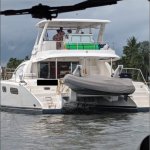Maritime Vessel Ruling
The Louisiana Supreme Court has ruled, once and for all, on whether a riverboat constitutes a “vessel” under federal maritime law. It is an important distinction because a case governed by admiralty law is very different than a case decided under state law.
It is an issue our maritime personal injury practice has followed closely here at Joseph Joy and Associates in Lafayette. Personal injury attorney Joseph “Buzzy” Joy worked offshore for many years before he began his law practice, including working on supply boats, crew boats and rigs. He understands the perils of working offshore and the many ways that individuals can be negligently injured. He protects the rights of injured seamen in federal Jones Act claims.
In fact, we first wrote about this issue months ago, when the Third Circuit Court of Appeals in Lake Charles held that the Grand Palais riverboat casino in Westlake was in fact a vessel in Caldwell v. St. Charles Gaming Co., for Jones Act purposes.*
The state’s highest court disagreed, concluding that the Grand Palais was not a vessel.
In Caldwell, Plaintiff Don Caldwell was injured while operating a scissor lift on the Grand Palais Casino riverboat casino moored in Lake Charles. He and his wife filed suit against his employer, the gaming company under the Jones Act. The gaming company defended by arguing the plaintiff was not a Jones Act seaman at the time of the incident, because he had no connection to a vessel in navigation that was substantial in nature and was never exposed to the perils of the sea.
A motion for summary judgment was denied at the trial court level and a three-judge panel of the 3rd Circuit agreed. But the plaintiffs went back to the appeals court asking for the entire Third Circuit Court to review the matter en banc, ie, together. The court agreed to an en banc review and held that the riverboat casino could be considered a vessel for purposes of the Jones Act.
The appeals court held the riverboat was a vessel even though it had not moved from its location since 2001. The frequency of its navigation did not enter into the appellate analysis. The riverboat was built to be navigable, noting that its owner maintained it to be navigable, whether it sailed or not.
The fact the boat was built to comply with state gaming regulations was irrelevant. La. R.S. 27:44 has no application to a determination of whether the riverboat casino is a vessel in navigation under federal admiralty law.
In an opinion issued Jan. 29, 2020, the Louisiana Supreme Court laid out the plaintiff’s burden: to prove the vessel is in navigation, and that his employment has a substantial connection to navigation, regularly exposing him to the “perils of the sea.” The Supreme Court relied heavily on Breaux v. St. Charles Gaming Co , a cased previously decided by Louisiana’s Third Circuit, citing the following:
In Stewart v. Dutra Constr. Co., 543 U.S. 481, 125 S.Ct. 1118, 160 L.Ed.2d 932 (2005), the Supreme Court discussed “the distinction drawn by the general maritime law between watercraft temporarily stationed in a particular location and those permanently affixed to shore or resting on the ocean floor.” 543 U.S. at 493–494, 125 S.Ct. 1118. The Court explained and clarified the term “vessel in navigation” with the following analysis: [T]he point was that structures may lose their character as vessels if they have been withdrawn from the water for extended periods of time. . . Instead, the “in navigation” requirement is an element of the vessel status of a watercraft. It is relevant to whether the craft is “used, or capable of being used” for maritime transportation. A ship long lodged in a drydock or shipyard can again be put to sea, no less than one permanently moored to shore or the ocean floor can be cut loose and made to sail. The question remains in all cases whether the watercraft’s use “as a means of transportation on water” is a practical possibility or merely a theoretical one.
543 U.S. at 496, 125 S.Ct. 1118 (citations omitted.)(emphasis by the court)
The court further stated that “Breaux was injured while on a gaming boat permanently attached to the shore, not used in navigation, and not performing any traditional maritime activity. Federal jurisprudence previously cited herein interpreted maritime jurisdictional rules and definitions as they pertain to similar casinos, finding such casinos to be outside the definition of a “vessel in navigation.”
The decision went on to say that federal case law also supported the finding that a floating casino permanently attached to the shore is not a vessel in navigation for purposes of general maritime law and admiralty jurisdiction. While the Grand Palais, is theoretically capable of navigation, the court found the fact it had not left the dock since 2001 supported the conclusion that it is not being used for the purpose of maritime transportation.
Had the Louisiana Supreme Court upheld the finding that the riverboat was a casino it would expand the reach of the Jones Act. Typically, land-based employers are immune under the state workers’ compensation act or Longshore and Harbor Workers’ Compensation Act (LHWCA). However, Jones Act seamen are not barred in any way from bringing a Jones Act claim against their employer or the owners of the vessels.
If you are a loved one sustained a personal injury on board a vessel, boat, or rig, contact the personal injury and maritime lawyers at Joseph Joy and Associates for a free consultation at 337-232-8123.
*Here’s how the Third Circuit reached that decision.
On their initial appeal, the three judge panel found that the Grand Palais was not a vessel under general maritime law, reasoning that the Grand Palais’ primary purpose was dockside gambling. For more than sixteen years, it had not been engaged in any maritime activity and had been moored at the same location with all operations required for its gaming activities operated via land-based services. While it was possible the Grand Palais could be returned to service as a vessel; the three-judge appellate panel felt that the evidence established that for more than sixteen years, it had been indefinitely moored to provide for and maintain its primary purpose of riverboat gaming. Thus, although the Grand Palais was originally designed to transport people over water, the panel ruled that as a result of changes to its physical characteristics, its purpose, and its actual function over the past sixteen years, the riverboat casino could no longer be considered a vessel for Jones Act purposes.
But that ruling changed drastically in a majority opinion published on July 3, 2019, after an en banc review by the full court. The admiralty law team at Joseph Joy and Associates found the excerpts below persuasive:
The undisputed facts, the Plaintiffs argue, reflect that the Grand Palais has not been removed from navigation, laid up, or mothballed. The Plaintiffs urge that the defendant spends considerable time and expense to ensure that the vessel remains capable of operating as required of all riverboat casinos in Louisiana. La.R.S. 27:44.1. The witnesses, the Plaintiffs add, agree that the condition of the Grand Palais has not materially changed since it ceased daily excursions in 2001, and that it was capable of navigation at the time Don was injured, April 9, 2015. The Grand Palais, connected to the dock by temporary connections and gangways designed to be lifted and retracted, could be made ready to sail in thirty minutes.
The defendant does not dispute that the Grand Palais was a vessel prior to August 2001. Therefore, the Plaintiffs contend that it remains a vessel until it is removed from navigation. At the time of the accident, the Grand Palais had not been disabled, removed from the water, or sunk to the bottom of the lake, enclosed in a cofferdam. The Plaintiffs add that the defendant works diligently to maintain the Grand Palais in a fully-operational condition as required by law.




